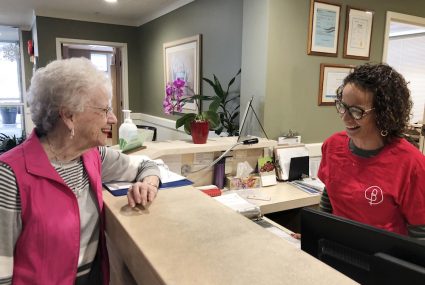You’ve likely heard the phrase, “respect your elders” used a few times before. It’s an adage that still rings true today, even though times have changed a lot. It’s easy to forget that we often need to adjust our behaviour a bit when we’re around the seniors in our lives. After all, seniors have been through a lot in life and are kind enough to share their wisdom and experience with us. Showing them the respect they deserve is a way to show them how much you appreciate the things they have taught you and will continue to teach you.
Why Respect is Important to Seniors
It’s important to remember that they grew up in a different time, where elders were often addressed more formally and therefore are used to a certain level of respect. Because of this, they will expect to be treated in the same manner they treated their elders. While we might be used to more casual tones with each other, an older person might find this a bit insulting.
People can sometimes be dismissive of seniors, too. It’s important to listen carefully to their concerns and show them you understand and truly hear what they have said. When you communicate, both verbally and non-verbally, there are a few small things you can do to ensure they feel respected at all times.
1. Address them properly
It’s easy to think of seniors as “cute” in the same way we think of children as “cute.” The problem with this comes when we speak to them in the same way we address our children. They’re used to a certain level of formality and respect, and you should do your best to stick to that. Avoid the use of endearment names such as “sweetie” or “dear” which can be demeaning. Instead, ask them how they would prefer to be addressed. They might like to keep it more formal with a title and their last name (eg: Mrs. Smith), or be called by their first name or a pet name.
At Bria Communities, our staff is careful to never assume that we know how they want to be addressed. We may have heard a friend or family member use one name, but it doesn’t necessarily mean they want us to use it. It’s important for us to ensure every resident feels comfortable in their home, which might mean a more formal name or the friendliness of a pet name.
2. Speak clearly
Language naturally changes and evolves over time, so it’s normal to let modern slang words fall into your vocabulary. However, this can be a problem when you speak with seniors. They might not understand certain words, which could be frustrating. It’s also important to think about how you adjust your manner of speaking – don’t assume they need you to yell or speak slowly as if they don’t understand. However, be prepared to speak louder or slow down if they ask you to.
3. Practice good manners
This one is quite simple. Show them courtesy and offer assistance where appropriate. Hold doors open for seniors, offer to reach things on high shelves, offer them a hand when they get up from a chair or sit down. These are all good things to put into practice with both your loved ones and with seniors you encounter when you’re out and about. These small gestures are always much appreciated by all.
4. Give them their space
Be there to provide assistance when they need it, but don’t hover over them. It’s important for seniors to feel independent and you can ensure they maintain that independence by respecting their boundaries. This means giving them the time and space to accomplish what they’re doing.
Seniors might take a little longer to get through a task, but that doesn’t mean they can’t do it on their own. Jumping in to finish it for them when we think they’re being too slow is quite disrespectful. This means being patient with them, whether it’s on the road, in stores, or at home. Be supportive when they express the desire to do things on their own and let them know that you are there if they do need a hand, but don’t assume that working slowly means they can’t do it.
5. Show some trust
It’s natural to want to be involved in major decisions when it comes to your loved ones. However, it’s important to know your place in the process. When they see that you trust them to still make choices on their own, it’s a huge sign of respect in their eyes. Talk to them about what’s going on in their life and stay informed – they will appreciate your concern and will naturally seek your input when they need it.
At Bria Communities, respect is of the utmost importance when it comes to our residents. We want to ensure every resident feels appreciated and respected at all times. We’re there to provide support when they need it, but also encourage them to be independent. We always strive to make it a fun and engaging place to live and socialize, while making sure to treat everyone in a respectful manner.

Comments